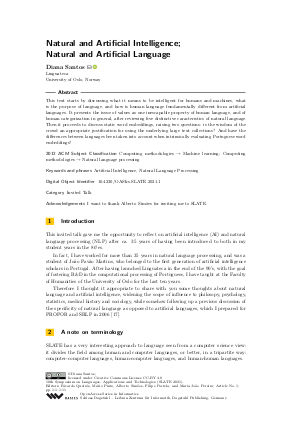Natural and Artificial Intelligence; Natural and Artificial Language (Invited Talk)
Author
Diana Santos 
-
Part of:
Volume:
10th Symposium on Languages, Applications and Technologies (SLATE 2021)
Part of: Series: Open Access Series in Informatics (OASIcs)
Part of: Conference: Symposium on Languages, Applications and Technologies (SLATE) - License:
 Creative Commons Attribution 4.0 International license
Creative Commons Attribution 4.0 International license
- Publication Date: 2021-08-10
File

PDF
OASIcs.SLATE.2021.1.pdf
- Filesize: 0.5 MB
- 11 pages
Document Identifiers
Subject Classification
ACM Subject Classification
- Computing methodologies → Machine learning
- Computing methodologies → Natural language processing
Keywords
- Artificial Intelligence
- Natural Language Processing
Metrics
- Access Statistics
-
Total Accesses (updated on a weekly basis)
0Document
0Metadata
Abstract
This text starts by discussing what it means to be intelligent for humans and machines, what is the purpose of language, and how is human language fundamentally different from artificial languages. It presents the issue of values as one inescapable property of human language, and of human categorization in general, after reviewing five distinctive caracteristics of natural language. Then it proceeds to discuss static word embeddings, raising two questions: is the wisdom of the crowd an appropriate justification for using the underlying large text collections? And have the differences between languages been taken into account when intrinsically evaluating Portuguese word embeddings?
Cite As Get BibTex
Diana Santos. Natural and Artificial Intelligence; Natural and Artificial Language (Invited Talk). In 10th Symposium on Languages, Applications and Technologies (SLATE 2021). Open Access Series in Informatics (OASIcs), Volume 94, pp. 1:1-1:11, Schloss Dagstuhl – Leibniz-Zentrum für Informatik (2021)
https://doi.org/10.4230/OASIcs.SLATE.2021.1
BibTex
@InProceedings{santos:OASIcs.SLATE.2021.1,
author = {Santos, Diana},
title = {{Natural and Artificial Intelligence; Natural and Artificial Language}},
booktitle = {10th Symposium on Languages, Applications and Technologies (SLATE 2021)},
pages = {1:1--1:11},
series = {Open Access Series in Informatics (OASIcs)},
ISBN = {978-3-95977-202-0},
ISSN = {2190-6807},
year = {2021},
volume = {94},
editor = {Queir\'{o}s, Ricardo and Pinto, M\'{a}rio and Sim\~{o}es, Alberto and Portela, Filipe and Pereira, Maria Jo\~{a}o},
publisher = {Schloss Dagstuhl -- Leibniz-Zentrum f{\"u}r Informatik},
address = {Dagstuhl, Germany},
URL = {https://drops.dagstuhl.de/entities/document/10.4230/OASIcs.SLATE.2021.1},
URN = {urn:nbn:de:0030-drops-144181},
doi = {10.4230/OASIcs.SLATE.2021.1},
annote = {Keywords: Artificial Intelligence, Natural Language Processing}
}
Author Details
Acknowledgements
I want to thank Alberto Simões for inviting me to SLATE.
References
-
Eckhard Bick. PALAVRAS, a Constraint Grammar-based Parsing System for Portuguese. In Tony Berber Sardinha and Thelma de Lurdes São Bento Ferreira, editors, Working with Portuguese Corpora, pages 279-302. Bloomsbury Academic, 2014.

-
John M. Ellis. Language, Thought and Logic. Northwestern University Press, 1993.

-
Francis Galton. Vox populi. Nature, 75(7):450-451, 1907.

-
Hugo Gonçalo Oliveira. Learning Word Embeddings from Portuguese Lexical-Semantic Knowledge Base. In Aline Villavicencio, Viviane P. Moreira, Alberto Abad, Helena de Medeiros Caseli, Pablo Gamallo, Carlos Ramisch, Hugo Gonçalo Oliveira, and Gustavo Henrique Paetzold, editors, Computational Processing of the Portuguese Language - 13th International Conference, PROPOR 2018, Canela, Brazil, September 24-26, 2018, Proceedings, pages 265-271. Springer, Cham, 2018.

-
Hugo Gonçalo Oliveira, Tiago Sousa, and Ana Alves. TALES: Test set of Portuguese Lexical-Semantic Relations for Assessing Word Embeddings. In Proceedings of the Workshop on Hybrid Intelligence for Natural Language Processing Tasks HI4NLP (co-located at ECAI-2020), pages 41-47, 2020.

-
Jang Graat. How Humans Succeed While Failing to Communicate, 2020. Abstract of keynote at SLATE'20.

-
Edouard Grave, Piotr Bojanowski, Prakhar Gupt, Armand Joulin, and Tomas Mikolov. Learning Word Vectors for 157 Languages. In Proceedings of LREC 2018, pages 3483-3487, 2018.

-
Nathan S. Hartmann, Erick R. Fonseca, Christopher D. Shulby, Marcos V. Treviso, Jéssica S. Rodrigues, and Sandra M. Aluísio. Portuguese Word Embeddings: Evaluating on Word Analogies and Natural Language Tasks. In Proceedings of Symposium in Information and Human Language Technology, Uberlândia, MG, Brazil, October 2–5, 2017, 2017.

- Jan Lorenz, Heiko Rauhutb, Frank Schweitzera, and Dirk Helbing. How social influence can undermine the wisdom of crowd effect. PNAS - Proceedings of the National Academy of Sciences of the United States of America, 108(22), 2011. URL: https://doi.org/10.1073/pnas.1008636108.
- Rada Mihalcea. The Ups and Downs of Word Embeddings, 2021. Seminar 19 May 2021. URL: https://www.youtube.com/watch?v=33XtLnPDOC0.
- Luke Oakden-Rayner, Jared Dunnmo, Gustavo Carneiro, and Christopher Ré. Hidden stratification causes clinically meaningful failures in machine learning for medical imaging. In Proceedings ACM Conference on Health Inference Learning, page 151–159, 2020. URL: https://doi.org/10.1145/3368555.3384468.
-
Rosalind Picard. Affective Computing. MIT Press, 1997.

-
Kent Pitman. What Programming Language Design Taught Me About Life, 2018. Abstract of keynote at SLATE'18.

-
João Rodrigues, António Branco, Steven Neale, and João Silva. LX-DSemVectors: Distributional Semantics Models for the Portuguese Language. In João Silva, Ricardo Ribeiro, Paulo Quaresma, André Adami, and António Branco, editors, Computational Processing of the Portuguese Language: 12th International Conference, PROPOR 2016, Tomar, Portugal, July 13-15, 2016, Proceedings, pages 259-270. Springer, 2016.

-
Boaventura de Sousa Santos. Epistemologies of the South. Justice against Epistemicide. Paradigm Publishers, 2014.

-
Delfim Santos. Sobre o conceito de cultura. In Obras Completas, vol. III (1953-1966), pages 543-550. Gulbenkian, 2011. 3.a edição, revista e ampliada. Organização e notas: Cristiana de Soveral.

- Diana Santos. What is natural language? Differences compared to artificial languages, and consequences for natural language processing, 2006. Invited lecture, SBLP2006 and PROPOR'2006, Itatiaia, RJ, Brazil, 15 May 2006. URL: https://www.linguateca.pt/Diana/download/SantosPalestraSBLPPropor2006.pdf.
- Diana Santos. Grandes quantidades de informação: um olhar crítico, 2021. Invited lecture, HD-Rio 2020/2021, 14 April 2021. URL: https://www.youtube.com/watch?v=Qi-3QzP0NxM0.
- Diana Santos. Palavras pulverizadas: algumas experiências, 2021. URL: https://github.com/linguateca/PalavrasPulverizadas/blob/main/valoresPalPulv.pdf.
- Diana Santos and Belinda Maia. Language, emotion, and the emotions: A computational introduction. Language and Linguistics compass, 12(5), 2018. URL: https://doi.org/10.1111/lnc3.12279.
-
Peter Sedgwick. Illness - mental and otherwise. Hastings Center Studies, 1(3):19-40, 1973.

-
George Steiner. After Babel: aspects of language and translation. Oxford University Press, 1992. 1st edition 1975.

-
Vahe Tshitoyan, John Dagdelen, Leigh Weston, Alexander Dunn, Ziqin Ron, Olga Kononova, Kristin A. Persson, Gerbrand Ceder, and Anubhav Jain. Unsupervised word embeddings capture latent knowledge from materials science literature. Nature, 571:95-–98, 2019.

- Frank van Harmelen. Hybrid Intelligence: AI systems that collaborate with people, instead of replacing them, 2020. Keynote at IC3K 2020. URL: http://www.ic3k.org/Documents/Previous_Invited_Speakers/2020/IC3K_2020_KS_3_Presentation.pdf.
